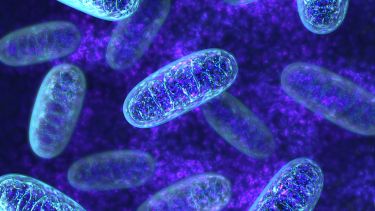Treating neurodegenerative diseases by boosting mitochondria
A new partnership between the Sheffield Institute for Translational Neuroscience (SITraN) and Nanna Therapeutics will advance mitochondrial drug discovery research for neurodegenerative diseases.

Mitochondria are known as the cell's powerhouse. They are central to cell health and a key player in preventing neurodegeneration. Our researchers are collaborating with a UK-based biotechnology company to help progress their pioneering mitochondrial drug discovery research.
A new partnership between the University of Sheffield and Nanna Therapeutics
Researchers at the Sheffield Institute for Translational Neuroscience (SITraN) are at the forefront of screening drugs in patient derived cells. The new partnership with Nanna Therapeutics offers a fantastic opportunity to progress this pioneering research. It will give researchers access to the resources and chemistry expertise on compounds that could offer viable mitochondrial therapies for neurodegenerative diseases including motor neuron disease (MND) and Parkinson's disease.
Dr Heather Mortiboys, Senior Lecturer and academic lead in the new collaboration, explains, “In Sheffield, we use advanced methods to screen thousands of compounds in patient-derived skin cells. We can grow brain cells from the skin cells of patients. This technique, starting with patient cells, means that potential drugs are more likely to work when used in patients. Our scientists have developed a way to generate brain cells in high numbers - something never achieved before - to test the identified drugs on these patient-derived cells.”
The project will bring together research expertise from the Neuroscience Institute.
- Astrocyte screening, Dr Laura Ferraiuolo
- In depth metabolomic evaluation, Dr Scott Allen
- Mitochondrial expertise and screening, Dr Heather Mortiboys
- Motor neuron disease (MND) clinical and scientific expertise, Dr Tom Jenkins and Professor Dame Pamela Shaw
- Parkinson’s Disease clinical and scientific expertise, Professor Oliver Bandmann
Professor Dame Pamela Shaw, Director of SITraN and the National Institute for Health Research (NIHR) Sheffield Biomedical Research Centre explains “It’s vital that industry and academia work together to develop viable treatments for neurodegenerative diseases – which is why we are launching an exciting new partnership with Nanna Therapeutics that will focus on mitochondrial therapeutics for MND and Parkinson’s disease."
"We are looking forward to developing this partnership to enhance our drug discovery research and offer real benefits to patients with these devastating diseases.”
Stuart Wood, Chief Technology Officer at Nanna Therapeutics said “At Nanna Therapeutics we specifically focus on therapies that act via mitochondrial function to treat a wide number of diseases. The partnership with Sheffield will allow us to work with their experts to identify compounds that are improving mitochondrial function as a target to treat neurodegenerative diseases and discover new molecules that can be advanced to the clinic and treating patients”
“The collaboration with SITraN will provide rapid access to world leading facilities and reagents, the team have the models, experience and skills to help us develop drugs to treat Parkinson’s, MND and other neurodegenerative diseases.”
The first phase of the project will involve testing current Nanna Therapeutics compounds which are known to enhance mitochondrial function to test if they have application in neurodegenerative diseases. We will also be screening new compounds on skin cells that can be developed in the future. These projects will move into reprogrammed cells such as neurons and astrocytes for more detailed read outs. Any potential therapies identified would follow the pipeline used in Sheffield that spans basic scientific research to clinical trials with patients and is supported by the NIHR Sheffield Biomedical Research Centre.
The role of mitochondria in neurodegeneration
Mitochondria are the cell's powerhouse, or battery, and provide energy as well as other critical roles in keeping cells functional and healthy. Mitochondria can play a pivotal role in the development of neurodegenerative diseases like MND and Parkinson’s disease. Neuroscience researchers in SITraN are investigating therapies that could help rescue mitochondria and improve the lives of patients.
Parkinson’s disease is a common debilitating condition, which is relentlessly progressive and currently affects 145,000 people in the UK. In Parkinson's disease the brain cells particularly affected contain the chemical dopamine, which is vital for healthy coordination and movement. These cells rely on energy-producing mitochondria to function, but in people living with Parkinson’s, the mitochondria are disrupted and the cells begin to fail and slowly die.
Motor neuron disease (MND) - also known as amyotrophic lateral sclerosis (ALS) - affects approximately 5,000 people in the UK. The progressive disease affects a patient’s ability to walk, talk, use their arms and hands, eat and even breathe. In MND, some of the longest cells of the central nervous system are affected - the motor neurons. These cells, and the cells which surround and support them, astrocytes, are particularly reliant on mitochondria to maintain energy and other important chemical balances including crucial communication between the neurons and astrocytes. In MND, mitochondrial function declines and is one of the key mechanisms which leads to the cells dying.
Some potential treatments, that aim to rescue mitochondria, are already in clinical trials with Parkinson’s and MND patients. However, there aren’t currently any treatments that are widely available to patients.
